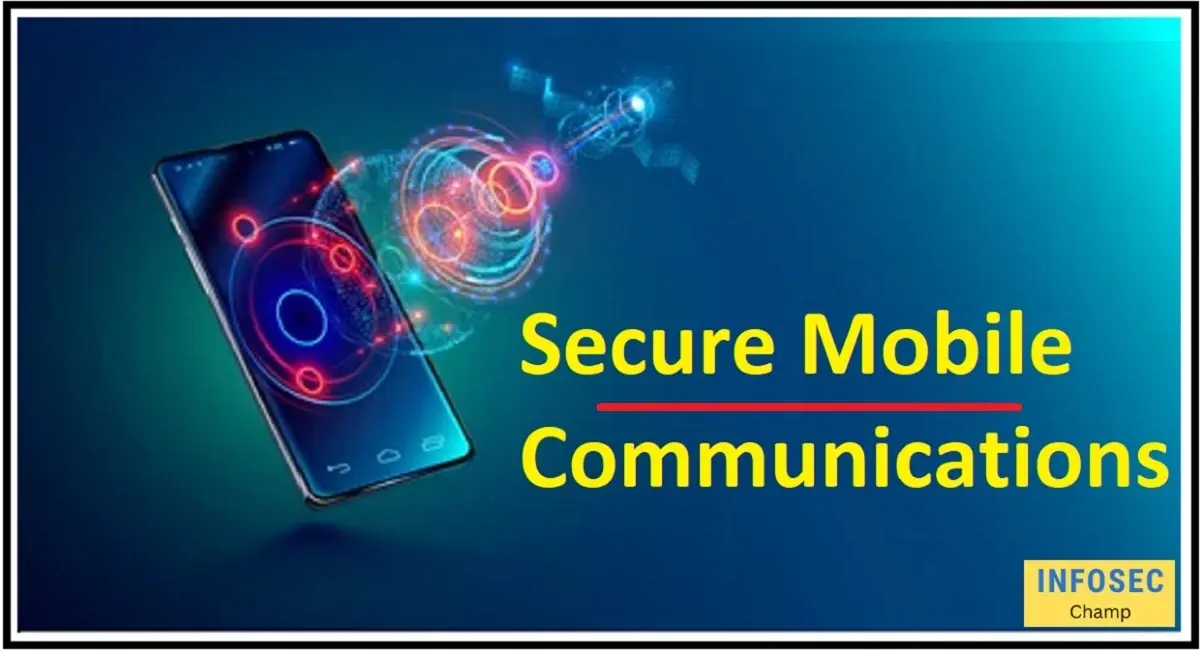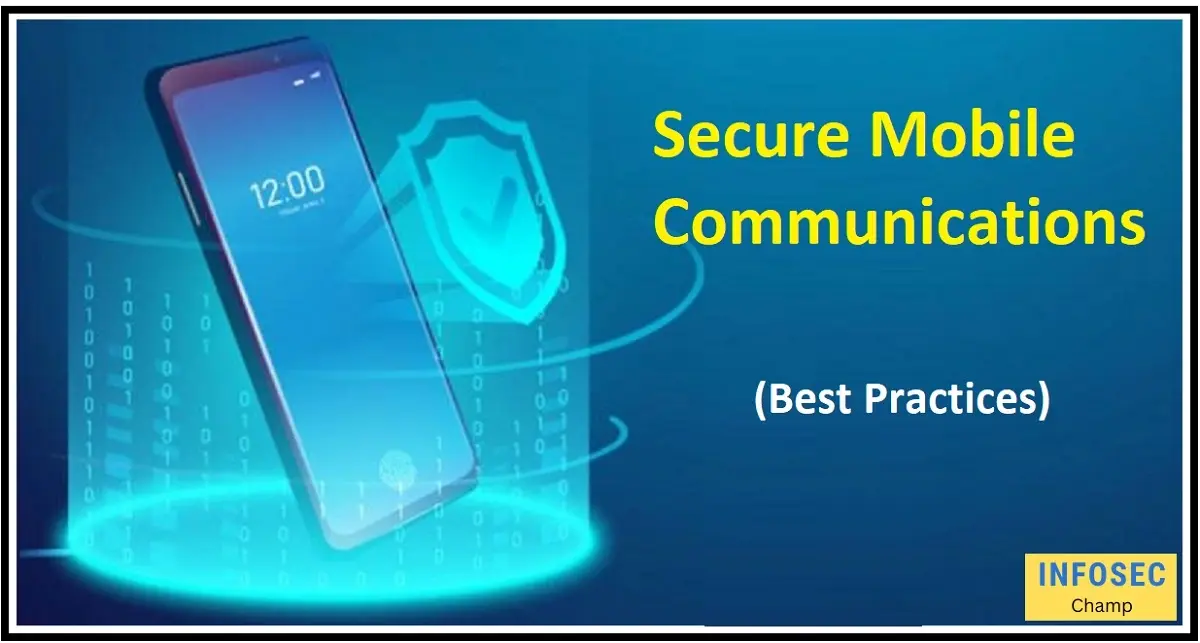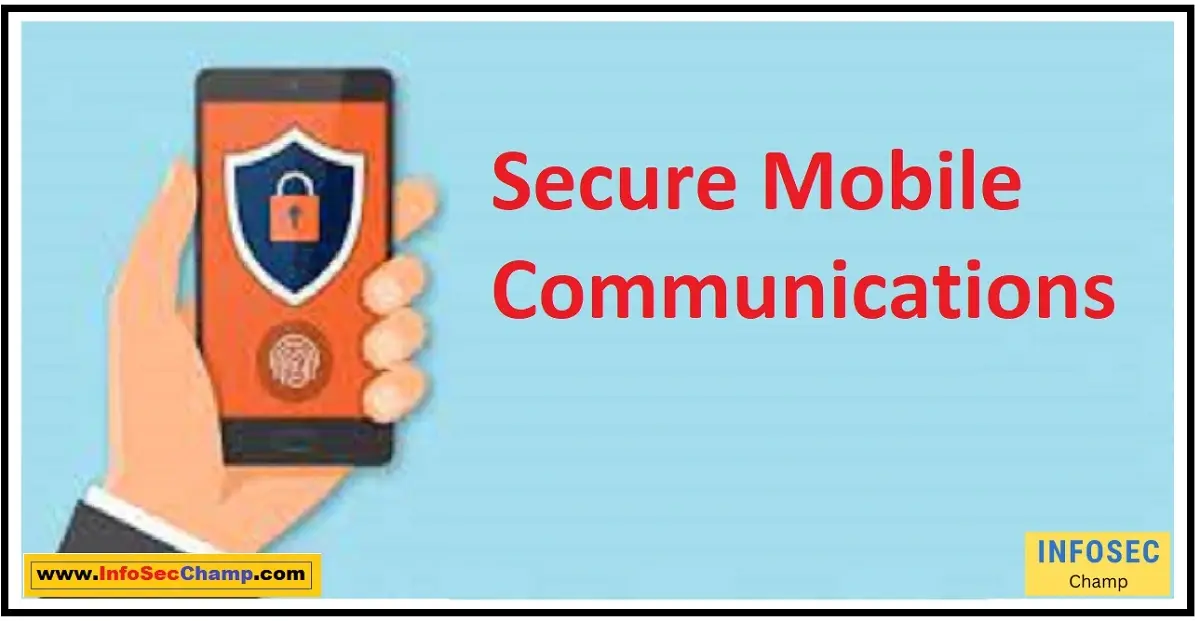In the modern world when almost everyone uses mobile devices for communication, secure mobile communications have emerged as a crucial component of securing sensitive information and maintaining privacy. The process of protecting mobile communication channels from unauthorized access, interception, and attacks is referred to as secure mobile communications. Ensuring that only authorized receivers have access to data and communications, can be accomplished using encryption, authentication, and other security procedures.
To comprehend what secure mobile communications are and why they are significant, consider the following crucial points:
- Encryption: A key component of secure mobile communications is encryption. It entails transforming plain text messages and data into a coded language that is only understandable by authorized persons who have access to a decryption key. This ensures that private information is kept private by making it challenging for hackers to intercept and read the communication.
- Authentication: Authentication makes assurance that the person who receives a communication is the intended recipient. Passwords, biometric authentication, and two-factor authentication are a few ways to accomplish this.
- Protection against cyber threats: Cyber attacks on mobile devices can compromise sensitive data and cause data breaches. By ensuring that communication routes are secure, data is encrypted, and data is authenticated, secure mobile communications assist defend against these attacks.
- Compliance: Regulations governing data protection and privacy must be followed by many enterprises. By ensuring that sensitive data is safeguarded, secure mobile communications assist enterprises in adhering to these requirements and lower the likelihood of regulatory violations and the resulting fines.
- Remote work: Working remotely has become increasingly common, making secure mobile communications even more important. Remote workers may make sure they are talking securely with their coworkers and clients by using secure mobile communication apps, safeguarding critical data from online risks.
In the mobile-first world of today, secure mobile communications are crucial for safeguarding private information and sensitive data. Organizations can make sure that their communication channels are safe, defend against cyber threats, and adhere to regulations by utilizing encryption, authentication, and other security procedures.
How to implement secure mobile communications in your organization?
The workflow of any organization in the modern world now includes mobile communication as a crucial component. Yet, there is also a higher danger of data breaches and security risks due to the growing reliance on mobile devices for communication. Protecting sensitive information from possible attackers requires your company to use secure mobile communications. The following actions can be taken to create secure mobile communications in your company:
- Conduct a Risk Assessment: The first step is to evaluate the risks and pinpoint any potential dangers to the mobile communication systems of your firm. You will gain a better understanding of the weaknesses by doing this.
- Define Security Policies: Create a thorough set of security regulations that regulate the usage of mobile devices for communication within your firm. The dos and don’ts of secure mobile communication practises should be outlined in these policies.
- Use Secure Communication Channels: Decide on encrypted and secure communication routes. These can include virtual private network (VPN) connections, encrypted email clients, or secure chat applications.
- Train Your Employees: Educate your staff on the best ways to communicate securely through mobile devices, including how to use secure email clients and messaging apps, how to manage passwords, and how to keep their devices secure.
- Monitor and Manage Devices: Always keep an eye on and control the mobile devices your company uses for communication. Implementing device management software that enables remote data wiping from lost or stolen devices is part of this.
- Keep Software Up-to-Date: To guarantee that mobile devices are protected against known vulnerabilities and security threats, update software on a regular basis.
- Enforce Policies: It’s crucial to uphold the security guidelines you’ve developed. This entails consistently keeping an eye on compliance and executing penalties for non-compliance.
It’s crucial to keep in mind nevertheless that developing secure mobile communications is a continuous process. To remain ahead of possible dangers, you must continue to evaluate risks and alter policies as appropriate.
Who should be responsible for ensuring secure mobile communications?
Mobile devices have become indispensable for both personal and professional use in today’s world of digital communication. The demand for secure mobile communication is growing along with mobile communication itself. However the issue of who should be in charge of maintaining secure mobile communications arises.
As the duty of maintaining secure mobile communication can change depending on the circumstance, there is no universally applicable response to this topic. Yet there are a few significant parties who are crucial to guaranteeing safe mobile communications:
- IT Departments: In the majority of businesses, the IT division is in charge of overseeing the organization’s networks, security standards, and mobile devices. They are also in charge of putting in place and maintaining security precautions including firewalls, encryption, and data protection. As a result, the IT department should play a crucial position in guaranteeing safe mobile communication.
- Mobile Device Manufacturers: It is the duty of mobile device makers to make sure that their products include security measures that shield user data and privacy. This includes attributes like facial recognition, fingerprint scanners, and encryption.
- App Developers: As they are in charge of creating safe apps that safeguard user data and privacy, app developers are essential to maintaining secure mobile communication.
- Users: In the end, users are also very important for guaranteeing safe mobile communication. People must be accountable for their own security by using strong passwords, routinely updating their gadgets and programs, and refraining from unsafe habits like using public Wi-Fi networks.

When to use secure mobile communications and when is it not necessary?
In the current digital era, where sensitive information is frequently transmitted through mobile devices, secure mobile communications have become more and more important. Yet, not all mobile communications require the same level of security. These are some situations where using secure mobile communications is required and when it is not:
| Scenario | When to Use Secure Mobile Communications | When It’s Not Necessary |
| Business meetings | Discussions involving confidential business information, such as financial statements, customer data, and trade secrets. | General discussions about non-sensitive topics, such as office parties or team-building activities. |
| Remote work | When employees work remotely, they may use personal devices to access company data, making it essential to use secure mobile communications to prevent data breaches. | When employees work from the office and use company-owned devices that are already secured by IT departments. |
| Healthcare | Healthcare professionals need to exchange patient data and medical records, making secure mobile communications necessary to protect sensitive information. | General discussions about non-sensitive topics, such as office parties or team-building activities. |
| Finance | Financial professionals exchange sensitive data, such as bank account information, credit card numbers, and other financial information, making secure mobile communications necessary. | General discussions about non-sensitive topics, such as office parties or team-building activities. |
| Legal | Legal professionals need to exchange confidential information, such as case details, legal opinions, and other sensitive data, making secure mobile communications necessary. | General discussions about non-sensitive topics, such as office parties or team-building activities. |
If sensitive information is transferred or kept on mobile devices, it is crucial to employ secure mobile communications. Financial data, medical records, legal documents, and other secret company information may fall under this category. Employees who work remotely must also use secure mobile communications because personal devices could not be as secure as those controlled by the firm.
On the other hand, using secure mobile communications isn’t usually required for casual conversations about uncomplicated subjects. Parties at work or team-building exercises, for instance, might not need the same level of protection as conversations about money or the law. It is up to individual businesses to decide whether using secure mobile communications is necessary for certain scenarios and when it is not.
Where can you find secure mobile communication tools and services?
As more and more sensitive information is exchanged via mobile devices, it is crucial to ensure safe mobile communication. It is possible to secure mobile communications for both individuals and enterprises with the help of a variety of tools and services. Here are some options:
- Mobile Device Management (MDM) Solutions: MDM solutions assist enterprises in managing and securing their mobile devices by enforcing security policies, erasing devices remotely, and restricting access to apps and data. VMware AirWatch, MobileIron, and IBM MaaS360 are a few well-known MDM systems.
- Secure Messaging Apps: There are a number of secure messaging applications available that feature end-to-end encryption to safeguard messages and data. Some popular options are Signal, WhatsApp, and Telegram.
- Virtual Private Networks (VPNs): VPNs offer a secure connection between a mobile device and a remote server, encrypting all data sent between the two. NordVPN, ExpressVPN, and CyberGhost are a few prominent VPNs.
- Mobile encryption apps: On a mobile device, encryption apps can be used to encrypt certain files or folders. VeraCrypt, AxCrypt, and Boxcryptor are a few well-known encryption software programs.
- Secure Email Providers: Secure email providers provide end-to-end encryption and other security measures to safeguard email communications. ProtonMail, Tutanota, and Hushmail are a few well-known secure email service providers.
- Two-Factor Authentication (2FA) Apps: 2FA provides an extra degree of security to mobile communications by requiring a second factor, such as a fingerprint or a code produced by an app, to log in. Google Authenticator, Authy, and Microsoft Authenticator are a few of the most well-known 2FA applications.
- Mobile antivirus software: Antivirus software can assist in safeguarding mobile devices from malware and other security risks. Norton Mobile Security, Avast Mobile Security, and McAfee Mobile Security are a few examples of well-liked mobile antivirus software alternatives.
In addition to these choices, it’s crucial to investigate and assess the security aspects of any mobile communication tools and services before utilizing them. Be sure they provide end-to-end encryption, reliable authentication methods, and other security features that suit your unique requirements. By employing these tools and services, people and organizations may help ensure that their mobile communications are safe and protected from illegal access and data breaches.
Why is it essential to encrypt messages and data for secure mobile communications?
Yet, the importance of data security and privacy grows as mobile communication develops. Encrypting communications and data is a practical approach to guarantee that material is kept private and shielded from unauthorized access.
For secure mobile communications, it is important to encrypt messages and data for the following reasons:
- Protection against Cyber Attacks
One of the best ways to safeguard mobile communications against cyberattacks is encryption. It aids in preventing hackers from intercepting and reading sensitive data sent over mobile networks or the internet. Data is scrambled by an encryption, and only a decryption key can restore its original form. As a result, it is difficult for attackers to access and comprehend the data.
- Compliance with Data Privacy Regulations
Organizations are required to employ security measures to protect sensitive information under data privacy laws like GDPR and HIPAA. One of the main safeguards advocated by these regulations is encryption. Heavy fines and reputational harm can result from not adhering to these rules.
- Enhanced Data Confidentiality
Unauthorized data access can cause serious harm, and mobile devices are extremely susceptible to security breaches. Data confidentiality is improved via encryption, which makes sure that data is shielded from unauthorized access. Even if a gadget is lost or stolen, the encrypted data is still secure.
- Safe Data Transfer
Data transmission over the internet or mobile networks is secure when it is encrypted. While accessing public Wi-Fi networks, which are extremely susceptible to cyberattacks, this is especially crucial.
- Protection against Insider Threats
Data is shielded from insider dangers by encryption as well. Workers who have access to sensitive information may utilize it improperly or accidentally release it. Encryption ensures that even if an employee obtains unauthorized access to data, they are unable to decrypt it without the decryption key.
Message and data encryption is crucial for safe mobile communications, to sum up. It offers defense against cyberattacks, makes sure that data privacy laws are followed, improves data confidentiality, makes safe data transfer possible, and guards against insider threats. As part of their plan for secure mobile communications, organizations should give priority to the installation of encryption.
How can you ensure secure mobile communications while working remotely?
Employees can now access critical company data from anywhere using their mobile devices thanks to technological advancements. This convenience, nevertheless, comes with a unique set of security difficulties. To protect sensitive information from online threats, it is essential to ensure secure mobile communications when working remotely. Here are a few strategies for maintaining safe mobile communications when working from a distance:
- Use a Virtual Private Network (VPN): A VPN offers a safe connection for remote workers by encrypting data transmitted between the device and the internet. This makes sure that no one may intercept data, safeguarding private data from unlawful access.
- Keep your software updated: Your mobile device’s security depends on regular software upgrades. The majority of updates contain security patches that address flaws that hackers could exploit.
- Use strong passwords: Ensure the security of your mobile device by using strong passwords that are difficult to guess. Hackers will have a harder time guessing the password if it contains both uppercase and lowercase letters, digits, and special characters.
- Avoid public Wi-Fi: Avoid using public Wi-Fi since it is frequently insecure and can be used by hackers to steal important data. To ensure secure communication, it is advised to use a VPN or personal hotspot.
- Use secure messaging apps: Secure messaging apps like Signal, WhatsApp, and Telegram use end-to-end encryption, which guarantees that only the sender and recipient can view the messages. This makes it challenging for hackers to intercept messages.
- Encrypt sensitive data: If you encrypt sensitive data on your mobile device, your data will be safe even if the device is lost or stolen.
Implement mobile device management: MDM enables businesses to govern and manage mobile devices used by remote workers. MDM enables businesses to enforce security regulations including device encryption, password requirements, and remote device wiping in the event of a lost or stolen device.
In sum, maintaining secure mobile communications while working remotely is essential for preventing cyberattacks on important data. To maintain secure mobile communications, you can use a VPN, keep your software up to date, use strong passwords, stay away from public Wi-Fi, use secure messaging apps, encrypt sensitive data, and put mobile device management into practice.

What are the 25 Best Practices for Secure Mobile Communications
Mobile devices have become a crucial component of our daily life in the current digital era. But as our reliance on mobile devices grows, so too has the danger of cyberattacks.
To protect mobile conversations, follow these 25 guidelines:
- Keep your operating system and apps updated with the latest patches and security updates.
- Use strong passwords or passphrases and avoid using the same password for multiple accounts.
- Enable two-factor authentication for all accounts that support it.
- Encrypt all data at rest and in transit, including messages, files, and backups.
- Avoid using public Wi-Fi networks, which can be easily intercepted by attackers.
- Use a virtual private network (VPN) when accessing the internet to encrypt your connection and mask your IP address.
- Use reputable antivirus and antimalware software to protect your device from malicious software.
- Disable Bluetooth, NFC, and other wireless connections when not in use.
- Use a password manager to generate and store complex passwords securely.
- Avoid downloading apps from untrusted sources and only download apps from official app stores.
- Review app permissions before installing apps and revoke permissions for apps that don’t need them.
- Use encrypted messaging apps like Signal, WhatsApp, or Telegram for sensitive communications.
- Disable the automatic connection to open Wi-Fi networks.
- Set up remote wipe capabilities to erase all data from your device if it’s lost or stolen.
- Use a secure messaging platform for work-related communications.
- Avoid clicking on links or downloading attachments from unknown or suspicious sources.
- Disable location tracking services for apps that don’t need them.
- Use biometric authentication, such as fingerprints or facial recognition, where available.
- Review and adjust your device’s privacy settings to limit data collection and sharing.
- Avoid jailbreaking or rooting your device, which can expose it to security vulnerabilities.
- Use a device that supports hardware-based encryption for added security.
- Be cautious when using social media apps and avoid sharing sensitive information.
- Use a reputable cloud storage service with encryption and two-factor authentication.
- Regularly back up your data to protect against data loss and ransomware attacks.
- Educate yourself on the latest security threats and how to protect against them.
You may considerably lower the risk of cyber threats and protect the security of your mobile communications by adhering to these best practices.
FAQ:
What is secure mobile communication?
Secure mobile communication refers to the process of securing mobile communication channels from unauthorized access, interception, and attacks, by encrypting messages and data, authenticating the intended recipient, protecting against cyber threats, complying with data protection regulations, and enabling remote work.
How can organizations implement secure mobile communication?
Organizations can implement secure mobile communication by first conducting a risk assessment, defining security policies, using secure communication channels such as VPNs, encrypted email clients, and secure chat apps, training employees on secure communication practices, monitoring and managing devices, keeping software up-to-date, and enforcing policies.
Who is responsible for ensuring secure mobile communication?
The responsibility of ensuring secure mobile communication can vary depending on the circumstance, but IT departments, mobile device manufacturers, app developers, and users are all important in ensuring secure mobile communication.
What are some secure mobile communication tools and services?
Secure mobile communication tools and services include Mobile Device Management (MDM) Solutions such as VMware AirWatch, MobileIron, and IBM, encrypted email clients like ProtonMail, and secure chat apps such as Signal and Telegram.
What is encryption in secure mobile communication?
Encryption is a key component of secure mobile communication that transforms plain text messages and data into a coded language that can only be understood by authorized persons with access to a decryption key. This ensures that private information is kept private and makes it difficult for hackers to intercept and read the communication.

